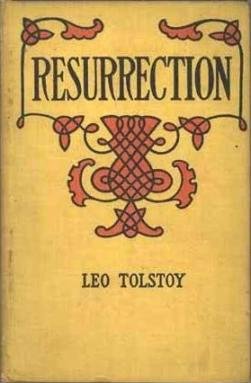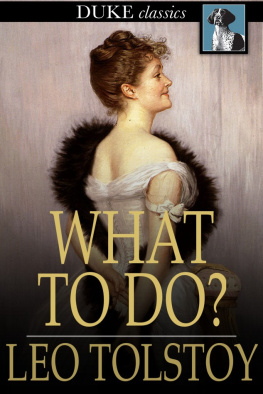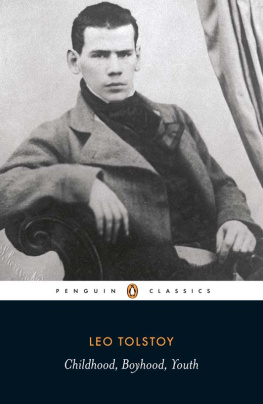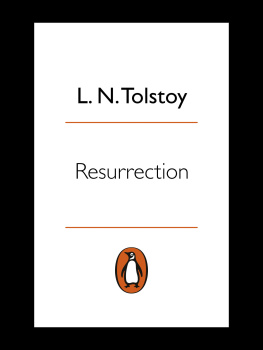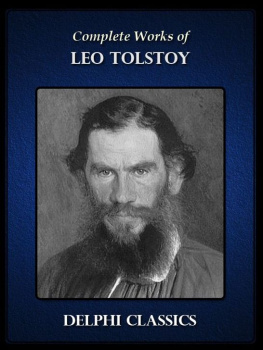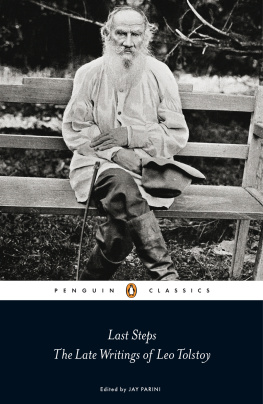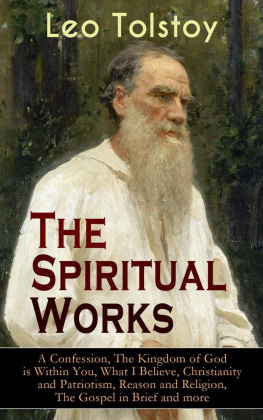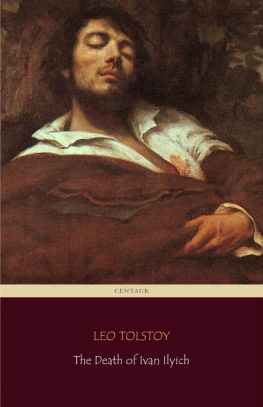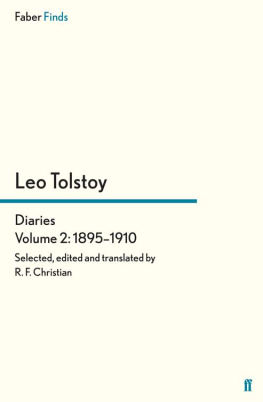Leo Tolstoy - Resurrection
Here you can read online Leo Tolstoy - Resurrection full text of the book (entire story) in english for free. Download pdf and epub, get meaning, cover and reviews about this ebook. genre: Detective and thriller. Description of the work, (preface) as well as reviews are available. Best literature library LitArk.com created for fans of good reading and offers a wide selection of genres:
Romance novel
Science fiction
Adventure
Detective
Science
History
Home and family
Prose
Art
Politics
Computer
Non-fiction
Religion
Business
Children
Humor
Choose a favorite category and find really read worthwhile books. Enjoy immersion in the world of imagination, feel the emotions of the characters or learn something new for yourself, make an fascinating discovery.
- Book:Resurrection
- Author:
- Genre:
- Rating:4 / 5
- Favourites:Add to favourites
- Your mark:
- 80
- 1
- 2
- 3
- 4
- 5
Resurrection: summary, description and annotation
We offer to read an annotation, description, summary or preface (depends on what the author of the book "Resurrection" wrote himself). If you haven't found the necessary information about the book — write in the comments, we will try to find it.
Resurrection — read online for free the complete book (whole text) full work
Below is the text of the book, divided by pages. System saving the place of the last page read, allows you to conveniently read the book "Resurrection" online for free, without having to search again every time where you left off. Put a bookmark, and you can go to the page where you finished reading at any time.
Font size:
Interval:
Bookmark:
Resurrection
by Leo Tolstoy
Translators Preface
Opinions about Tolstoy and his work differ, but on one point there surely might be unanimity. A writer of world-wide reputation should be at least allowed to know how to spell his own name. Why should any one insist on spelling it Tolstoi (with one, two or three dots over the i), when he himself writes it Tolstoy? The only reason I have ever heard suggested is, that in England and America such outlandish views are attributed to him, that an outlandish spelling is desirable to match those views.
This novel, written in the rough by Tolstoy some years ago and founded upon an actual occurrence, was completely rewritten by him during the last year and a half, and all the proceeds have been devoted by him to aiding the Doukhobors, a sect who were persecuted in the Caucasus (especially from 1895 to 1898) for refusing to learn war. About seven thousand three hundred of them are settled in Canada, and about a hundred of the leaders are exiled to the remote parts of Siberia.
Anything I may receive for my work in translating the book will go to the same cause. Prevention is better than cure, and I would rather help people to abstain from killing and wounding each other than devote the money to patch up their wounds after the battle.
Louise MaudeBook I
I
Maslova in prison.
Though hundreds of thousands had done their very best to disfigure the small piece of land on which they were crowded together, by paving the ground with stones, scraping away every vestige of vegetation, cutting down the trees, turning away birds and beasts, and filling the air with the smoke of naphtha and coal, still spring was spring, even in the town.
The sun shone warm, the air was balmy; everywhere, where it did not get scraped away, the grass revived and sprang up between the paving-stones as well as on the narrow strips of lawn on the boulevards. The birches, the poplars, and the wild cherry unfolded their gummy and fragrant leaves, the limes were expanding their opening buds; crows, sparrows, and pigeons, filled with the joy of spring, were getting their nests ready; the flies were buzzing along the walls, warmed by the sunshine. All were glad, the plants, the birds, the insects, and the children. But men, grown-up men and women, did not leave off cheating and tormenting themselves and each other. It was not this spring morning men thought sacred and worthy of consideration not the beauty of Gods world, given for a joy to all creatures, this beauty which inclines the heart to peace, to harmony, and to love, but only their own devices for enslaving one another.
Thus, in the prison office of the Government town, it was not the fact that men and animals had received the grace and gladness of spring that was considered sacred and important, but that a notice, numbered and with a superscription, had come the day before, ordering that on this 28th day of April, at 9 a.m., three prisoners at present detained in the prison, a man and two women (one of these women, as the chief criminal, to be conducted separately), had to appear at Court. So now, on the 28th of April, at 8 oclock, a jailer and soon after him a woman warder with curly grey hair, dressed in a jacket with sleeves trimmed with gold, with a blue-edged belt round her waist, and having a look of suffering on her face, came into the corridor.
You want Maslova? she asked, coming up to the cell with the jailer who was on duty.
The jailer, rattling the iron padlock, opened the door of the cell, from which there came a whiff of air fouler even than that in the corridor, and called out, Maslova! to the Court, and closed the door again.
Even into the prison yard the breeze had brought the fresh vivifying air from the fields. But in the corridor the air was laden with the germs of typhoid, the smell of sewage, putrefaction, and tar; every newcomer felt sad and dejected in it. The woman warder felt this, though she was used to bad air. She had just come in from outside, and entering the corridor, she at once became sleepy.
From inside the cell came the sound of bustle and womens voices, and the patter of bare feet on the floor.
Now, then, hurry up, Maslova, I say! called out the jailer, and in a minute or two a small young woman with a very full bust came briskly out of the door and went up to the jailer. She had on a grey cloak over a white jacket and petticoat. On her feet she wore linen stockings and prison shoes, and round her head was tied a white kerchief, from under which a few locks of black hair were brushed over the forehead with evident intent. The face of the woman was of that whiteness peculiar to people who have lived long in confinement, and which puts one in mind of shoots of potatoes that spring up in a cellar. Her small broad hands and full neck, which showed from under the broad collar of her cloak, were of the same hue. Her black, sparkling eyes, one with a slight squint, appeared in striking contrast to the dull pallor of her face.
She carried herself very straight, expanding her full bosom.
With her head slightly thrown back, she stood in the corridor, looking straight into the eyes of the jailer, ready to comply with any order.
The jailer was about to lock the door when a wrinkled and severe-looking old woman put out her grey head and began speaking to Maslova. But the jailer closed the door, pushing the old womans head with it. A womans laughter was heard from the cell, and Maslova smiled, turning to the little grated opening in the cell door. The old woman pressed her face to the grating from the other side, and said, in a hoarse voice:
Now mind, and when they begin questioning you, just repeat over the same thing, and stick to it; tell nothing that is not wanted.
Well, it could not be worse than it is now, anyhow; I only wish it was settled one way or another.
Of course, it will be settled one way or another, said the jailer, with a superiors self-assured witticism. Now, then, get along! Take your places!
The old womans eyes vanished from the grating, and Maslova stepped out into the middle of the corridor. The warder in front, they descended the stone stairs, past the still fouler, noisy cells of the mens ward, where they were followed by eyes looking out of every one of the gratings in the doors, and entered the office, where two soldiers were waiting to escort her. A clerk who was sitting there gave one of the soldiers a paper reeking of tobacco, and pointing to the prisoner, remarked, Take her.
The soldier, a peasant from Nijni Novgorod, with a red, pock-marked face, put the paper into the sleeve of his coat, winked to his companion, a broad-shouldered Tchouvash, and then the prisoner and the soldiers went to the front entrance, out of the prison yard, and through the town up the middle of the roughly-paved street.
Isvostchiks, tradespeople, cooks, workmen, and government clerks, stopped and looked curiously at the prisoner; some shook their heads and thought, This is what evil conduct, conduct unlike ours, leads to. The children stopped and gazed at the robber with frightened looks; but the thought that the soldiers were preventing her from doing more harm quieted their fears. A peasant, who had sold his charcoal, and had had some tea in the town, came up, and, after crossing himself, gave her a copeck. The prisoner blushed and muttered something; she noticed that she was attracting everybodys attention, and that pleased her. The comparatively fresh air also gladdened her, but it was painful to step on the rough stones with the ill-made prison shoes on her feet, which had become unused to walking. Passing by a corn-dealers shop, in front of which a few pigeons were strutting about, unmolested by any one, the prisoner almost touched a grey-blue bird with her foot; it fluttered up and flew close to her ear, fanning her with its wings. She smiled, then sighed deeply as she remembered her present position.
Font size:
Interval:
Bookmark:
Similar books «Resurrection»
Look at similar books to Resurrection. We have selected literature similar in name and meaning in the hope of providing readers with more options to find new, interesting, not yet read works.
Discussion, reviews of the book Resurrection and just readers' own opinions. Leave your comments, write what you think about the work, its meaning or the main characters. Specify what exactly you liked and what you didn't like, and why you think so.

